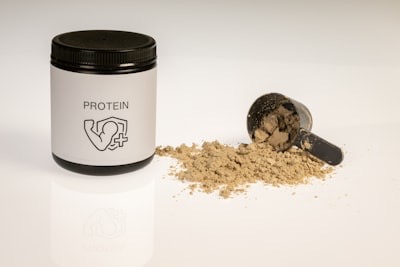Discover Top Health Brands for Vitamins & Supplements

Key Highlights
- Understanding the role of vitamins and supplements in overall health
- Exploring the benefits of different types of supplements, from heart health to immune support
- Highlighting essential vitamins like vitamin D, vitamin C, vitamin E, vitamin K
- Examining the benefits of specific vitamins like vitamin A for vision and immunity, vitamin C for skin health and immunity, vitamin D for bone health, and vitamin E for antioxidant properties and skin benefits
- Discussing the importance of key minerals like magnesium, zinc, and calcium for optimal health
- Exploring the benefits of super supplements like omega-3 fatty acids, fish oil supplements, and probiotics for heart health, cognitive function, and digestive health
- Highlighting specialty supplements like prenatal vitamins and sports supplements
- Providing tips on how to choose the right vitamins and supplements, including reading labels, understanding dosages, and considering quality and safety
- Addressing frequently asked questions about daily vitamin intake and the role of vitamins and supplements in a balanced diet
Introduction

Vitamins and supplements play a crucial role in supporting overall health and well-being. They provide the body with essential nutrients that are necessary for various bodily functions. While a balanced diet should ideally provide all the necessary vitamins and minerals, it may not always be possible to meet all our nutritional needs through food alone. This is where vitamins and supplements, particularly B vitamins, come in handy. They can help fill in the nutritional gaps and ensure that our bodies get the necessary nutrients, including B vitamins, to sustain energy levels, keep nerves and blood cells healthy, and support overall health.
In this ultimate guide to vitamins and supplements A-Z, we will explore the different types of supplements, the benefits they offer, and the essential vitamins and minerals that should not be missed. We will also discuss specialty supplements for specific needs and provide tips on how to choose the right vitamins and popular supplements. Whether you are looking to support your immune system, improve your heart health, enhance your skin, or boost your overall well-being, this guide will provide you with all the information you need to make informed decisions about your supplementation routine.
So, let’s dive in and explore the world of vitamins and supplements!
Understanding Vitamins, Multivitamin and Supplements
Vitamins and supplements are dietary supplements that contain essential nutrients. They can be taken to supplement a person’s diet and provide additional nutrition. While vitamins are organic compounds that are vital for the proper functioning of the body, supplements can include a wide range of products such as minerals, herbs, amino acids, enzymes, and more. These supplements come in various forms, including pills, capsules, powders, and liquids, with popular flavors like vanilla, chocolate, and strawberry. They are designed to be taken orally and can help support overall health and well-being.

The Role of Vitamins in Body Function Vitamins play a crucial role in supporting various body functions. They are essential for maintaining a healthy immune system, which is responsible for protecting the body against diseases and infections. Certain vitamins, such as vitamin C and vitamin E, act as antioxidants and help protect cells from damage caused by free radicals. Vitamins are also important for the production of red blood cells, which carry oxygen throughout the body. Additionally, vitamins play a key role in the proper functioning of the nervous system, helping to transmit signals between the brain and other parts of the body. Selenium, in particular, acts as an antioxidant to help fight infection and protect the body against oxygen free radical damage. Overall, vitamins are essential nutrients that support overall health and well-being.
Different Types of Supplements and Their Benefits

- Fish oil supplements: Fish oil is rich in omega-3 fatty acids, which have been shown to promote heart health, reduce inflammation, and support brain function.
- Probiotics: Probiotics are beneficial bacteria that promote a healthy gut microbiome, improve digestion, and support immune health.
- CoQ10: Coenzyme Q10 is an antioxidant that helps with energy production and provides antioxidant support.
- Turmeric: Turmeric contains a compound called curcumin, which has anti-inflammatory properties and can support joint health.
These are just a few examples of the many supplements available, each offering unique benefits for supporting overall health and well-being.
There are different types of supplements available in the market, each offering unique benefits. These supplements can support various aspects of health and well-being, including heart health, weight management, and immune support. Here are some examples:
Essential Vitamins You Should Not Miss

When it comes to vitamins, there are a few essential ones that you should not miss. These vitamins play crucial roles in supporting overall health. Here are some essential vitamins you should consider including in your supplement routine:
- Vitamin D: Known as the sunshine vitamin, vitamin D is important for bone health, calcium absorption, and immune function.
- Vitamin C: This vitamin is a powerful antioxidant that supports immune health, collagen production, and skin health.
- Vitamin E: Vitamin E is an antioxidant that helps protect cells from damage and supports heart health.
- Vitamin K: Vitamin K plays a key role in blood clotting and bone health.
Including these essential vitamins in your supplementation routine can help ensure that you are getting the necessary nutrients for optimal health.
Vitamin A: Benefits for Vision and Immunity

Vitamin A is an essential nutrient that plays a key role in vision, immune health, and healthy bones. It is important for maintaining good eyesight and promoting proper functioning of the retina. Vitamin A also helps support a healthy immune system, making it important for fighting off infections and diseases. Additionally, vitamin A plays a role in bone health by supporting the formation and maintenance of healthy bones. Including foods rich in vitamin A, such as carrots, sweet potatoes, spinach, and liver, in your diet can help ensure that you are getting enough of this important vitamin. If needed, vitamin A supplements can also be taken to support overall health.
Vitamin C: Importance for Skin Health and Immunity

Vitamin C is a powerful antioxidant that plays many important roles in the body. It is known for its ability to support a healthy immune system, making it an essential vitamin for fighting off infections and diseases. Vitamin C is also important for collagen production, which is crucial for maintaining healthy skin, joints, and connective tissues. Additionally, vitamin C acts as an antioxidant, helping to protect cells from damage caused by free radicals. Including foods rich in vitamin C, such as citrus fruits, strawberries, bell peppers, and broccoli, in your diet is important for getting enough of this vital vitamin. Vitamin C supplements, such as gummies, can also be taken to support overall health and well-being.
Vitamin D: Sunshine Vitamin for Bone Health

Vitamin D, also known as the sunshine vitamin, is essential for bone health and calcium absorption. It helps the body absorb calcium from the diet, which is important for maintaining strong and healthy bones. Vitamin D also plays a role in regulating the levels of calcium and phosphorus in the blood, which are crucial for bone formation and maintenance. In addition to its role in bone health, vitamin D is also important for overall health and well-being, making it a crucial nutrient for both vegans and non-vegans alike. It supports immune function, muscle function, and plays a role in regulating mood. While the body can produce vitamin D through exposure to sunlight, it can also be obtained through certain foods and supplements.
Vitamin E: Antioxidant Properties and Skin Benefits

Vitamin E is a powerful antioxidant that helps protect cells from damage caused by free radicals. It plays a key role in maintaining the integrity of cell membranes and protecting the skin from oxidative stress. Vitamin E also has potential benefits for heart health, as it helps prevent the oxidation of LDL cholesterol, which is a risk factor for heart disease. Additionally, vitamin E is involved in immune function and plays a role in gene expression. Including foods rich in vitamin E, such as nuts (like almonds), seeds, spinach, and broccoli, in your diet can help ensure that you are getting enough of this important vitamin. Vitamin E supplements can also be taken to support overall health and well-being.
Key Minerals for Optimal Health
In addition to vitamins, minerals are also essential for optimal health. Here are three key minerals that play important roles in the body:
- Magnesium: Magnesium is involved in over 300 biochemical reactions in the body and is important for muscle function, energy production, and maintaining healthy blood pressure.
- Zinc: Zinc is crucial for immune function, wound healing, and DNA synthesis. It also plays a role in taste and smell perception.
- Calcium: Calcium is essential for bone health, muscle function, and blood clotting. It is important for maintaining strong and healthy bones throughout life.
Including foods rich in these minerals, such as leafy greens, nuts, seeds, dairy products, and legumes, in your diet is important for getting enough of these vital nutrients.
Calcium: Essential for Bones and Teeth
Calcium is an essential mineral for maintaining strong and healthy bones and teeth. It is also important for muscle function, nerve transmission, and blood clotting. Calcium plays a crucial role in supporting bone growth and development, especially during childhood and adolescence. It also helps prevent bone loss and osteoporosis in older adults. In addition to its role in bone health, calcium is involved in many other bodily functions, including muscle contraction and relaxation, enzyme activity, and hormone regulation. Including calcium-rich foods in your diet, such as dairy products, leafy greens, and fortified foods, can help ensure that you are getting enough calcium. Calcium supplements can also be taken if needed.
Iron: Crucial for Blood Health
Iron is an essential mineral for the production of red blood cells, which carry oxygen throughout the body. It plays a crucial role in maintaining healthy blood and preventing anemia, a condition characterized by low levels of red blood cells or hemoglobin in the blood. Iron is also important for energy production and immune function. Including iron-rich foods in your diet, such as lean meats, seafood, beans, and fortified cereals, can help ensure that you are getting enough iron. Iron supplements can also be taken if needed, especially for individuals at risk of iron deficiency or anemia.
Magnesium: Benefits for Muscle Function and Sleep Quality
Magnesium is an essential mineral that plays a crucial role in many bodily functions. It is involved in over 300 biochemical reactions in the body and is important for muscle function, energy production, and maintaining healthy blood pressure. Magnesium also plays a role in promoting relaxation and supporting sleep quality, making it beneficial for individuals experiencing migraines. It helps regulate the neurotransmitters that are involved in sleep, such as melatonin and GABA. Including magnesium-rich foods in your diet, such as leafy greens, nuts, seeds, and whole grains, can help ensure that you are getting enough magnesium. Magnesium supplements can also be taken if needed, especially for individuals at risk of magnesium deficiency.
Super Supplements for Daily Health

Super supplements are those that offer unique health benefits beyond basic nutrition. Here are three super supplements that are popular for daily health:
- Omega-3 Fatty Acids: Omega-3 fatty acids, found in fish oil supplements, are known for their heart health benefits and their role in supporting cognitive function and joint health.
- Probiotics: Probiotics are beneficial bacteria that support digestive health, immune function, and overall gut health.
- CoQ10: CoQ10 is an antioxidant that supports energy production and provides antioxidant support.
Including these super supplements in your daily routine can help support your overall health and well-being.
Omega-3 Fatty Acids: Heart Health and Cognitive Function

Omega-3 fatty acids are a type of unsaturated fat that have been well-studied for their health benefits. They are known for their heart health benefits, as they help reduce inflammation, lower triglyceride levels, and support healthy cholesterol levels. Omega-3 fatty acids also play a crucial role in supporting cognitive function and brain health. They are important for brain development and can help improve memory and cognitive performance. Including omega-3-rich foods in your diet, such as fatty fish like salmon and sardines, and taking fish oil supplements can help ensure that you are getting enough of these important fatty acids.
Probiotics: Gut Health and Immune Support
Probiotics are beneficial bacteria that support gut health, digestive function, and immune health. They help maintain a healthy balance of bacteria in the gut and promote proper digestion and nutrient absorption. Probiotics also play a role in supporting the immune system, as a significant portion of the immune system is located in the gut. Including probiotic-rich foods in your diet, such as yogurt, kefir, and fermented vegetables, can help support a healthy gut microbiome. Probiotic supplements can also be taken if needed, especially for individuals who may have imbalances in their gut bacteria or digestive issues.
CoQ10: Energy Production and Antioxidant Support
Coenzyme Q10 (CoQ10) is a compound that is naturally produced by the body and is involved in energy production within cells. It plays a crucial role in converting food into energy that the body can use. CoQ10 is also a powerful antioxidant that helps protect cells from damage caused by free radicals. It supports overall cellular health and helps maintain the health of various organs and tissues, including the heart and brain. While the body produces CoQ10 naturally, levels may decline with age or due to certain health conditions. CoQ10 supplements can be taken to support energy production, antioxidant support, and overall cellular health.
Specialty Supplements for Specific Needs
In addition to general health supplements, there are also specialty supplements available for specific needs. Here are two examples:
- Prenatal Vitamins: Prenatal vitamins are specifically formulated to support the nutritional needs of pregnant women and their developing babies. They typically contain higher levels of certain vitamins and minerals, such as folic acid, iron, and calcium.
- Sports Supplements: Sports supplements are designed to support athletic performance, enhance recovery, and promote muscle growth. They can include protein powders, creatine, and other supplements that help support energy production and muscle function.
These specialty supplements can provide targeted support for individuals with specific needs.
Prenatal Vitamins: Support During Pregnancy
Prenatal vitamins are specially formulated to provide the essential nutrients needed during pregnancy. They contain higher levels of certain vitamins and minerals that are important for supporting fetal development and ensuring the health of both the mother and the baby. Prenatal vitamins typically contain higher levels of folic acid (400 mcg), iron, calcium, and other important nutrients. These vitamins and minerals are important for supporting the growth and development of the baby, preventing birth defects, and ensuring the mother’s health during pregnancy. Prenatal vitamins should be taken before conception and throughout pregnancy to ensure that both the mother and the baby are getting the necessary nutrients for a healthy pregnancy.
Sports Supplements: Boosting Performance and Recovery

Sports supplements are specifically designed to support athletic performance, enhance recovery, and promote muscle growth. They can help athletes and active individuals meet their increased nutritional needs and optimize their performance. Some examples of sports supplements include protein powders, which provide the necessary building blocks for muscle growth and repair, and creatine, which helps improve strength and power output. These supplements can also aid in muscle recovery, reduce muscle soreness, and support overall athletic performance. It is important to note that sports supplements should be used in conjunction with a healthy diet and training program to maximize their benefits.
How to Choose the Right Vitamins and Supplements
Choosing the right vitamins and supplements can be overwhelming with so many options available in the market. Here are some tips to help you make informed decisions:
- Consider your specific health needs and goals.
- Read product labels carefully to understand the ingredients and dosage.
- Research the brand’s reputation and quality standards.
- Look for supplements that have undergone third-party testing for purity and potency.
- Check for potential side effects and interactions with medications.
- Consider the form and delivery method that suits your preferences and needs.
- Seek advice from healthcare professionals or consult a registered dietitian for personalized recommendations.
- Consider the customer service and return policy of the brand or retailer.
By following these guidelines, you can choose the right vitamins and supplements that meet your individual needs and support your overall health.
Reading Labels and Understanding Dosages
When choosing vitamins and supplements, it is important to read product labels carefully and understand the dosages. Here are some key points to consider:
- Look for the recommended daily dosage and compare it to your specific needs.
- Pay attention to the form of the supplement (pill, capsule, powder, liquid) and choose one that suits your preferences.
- Check the expiration date to ensure that the product is still fresh and effective.
- Read the ingredient list to ensure that the supplement does not contain any allergens or ingredients that you may be sensitive to.
- Look for any additional instructions or precautions on the label, such as whether the supplement should be taken with food or on an empty stomach.
- If you have any specific health concerns or are taking any medications, consult with your healthcare provider to determine the appropriate dosage and timing of your supplements.
By understanding the information on the product label, you can make informed decisions and ensure that you are taking the supplements correctly.
Quality and Safety Considerations
When choosing vitamins and supplements, it is important to consider their quality and safety. Here are some key points to keep in mind:
- Choose reputable brands that follow good manufacturing practices and have a strong reputation.
- Look for third-party testing and certifications to ensure quality and purity.
- Consider any potential side effects or interactions with medications that you may be taking.
- If you have any underlying health conditions or are pregnant or breastfeeding, consult with your healthcare provider before starting any new supplements.
- Follow the recommended dosage and do not exceed the recommended intake unless advised by your healthcare provider.
- Store your supplements properly to maintain their potency and effectiveness.
- If you experience any adverse reactions or side effects, discontinue use and consult with your healthcare provider.
By considering these factors, you can ensure that you are choosing high-quality supplements that are safe and effective for your individual needs.
Conclusion
In the quest for optimal health and wellness, understanding the role of vitamins and supplements is crucial. These essential nutrients play a significant part in supporting various bodily functions, from bone health to immune support. By incorporating key vitamins like A, C, D, and E, along with important minerals such as calcium, iron, and magnesium, you can boost your overall well-being. Additionally, super supplements like omega-3 fatty acids and probiotics offer additional benefits for heart, cognitive function, gut health, and immune support. When choosing the right vitamins and supplements, always consider quality, safety, and your individual needs for a tailored approach to your health journey.
Frequently Asked Questions
What Vitamins Should I Take Daily?
The vitamins you should take daily depend on your individual needs and health goals. A multivitamin can be a good starting point to ensure you are getting essential vitamins and minerals. It is important to supplement a balanced diet with the necessary nutrients for overall wellness.
Can Vitamins and Supplements Replace a Balanced Diet?
While vitamins and supplements can help fill in nutritional gaps, they cannot replace a balanced diet. Whole foods provide a wide range of essential nutrients that are important for overall health. Supplements can be used to complement a balanced diet and address specific nutrient deficiencies.
https://www.nccih.nih.gov/health/bodybuilding-and-performance-enhancement-supplements
https://www.opss.org/article/energy-drinks-and-energy-shots-whats-problem
https://www.youtube.com/vitacost
